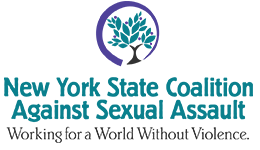NYSCASA’s mission is to end all forms of sexual violence and exploitation, and to address the impacts of sexual assault.
Therefore, NYSCASA recognizes that:
- Sexual violence is a human rights violation.
- All people and all communities are affected by sexual violence.
- Sexual violence is rooted in systemic oppressions that shape our society, including—but not limited to—white supremacy, racism, ableism, sexism, and homophobia.
- Access to support, advocacy, and medical care in the aftermath of sexual violence is similarly impacted by systemic oppression.
- In order to eliminate sexual violence, we must create a culture that actively fights for equity and opposes oppression in all its forms.
We commit ourselves to the following principles in order to minimize the incidence and impact of sexual violence:
- We affirm that justice, accountability, and healing look different for every survivor or victim.
- We understand that trauma is a subjective experience and that this experience can be very different depending on the individual. We also acknowledge that what is traumatic for one person may not be traumatic for another.
- We acknowledge historical trauma, intergenerational trauma, and other forms of trauma and their impact on survivors, especially Black and Indigenous survivors and those who are most marginalized.
- We support centering the voices and experiences of survivors who are the most marginalized.
- We support violence intervention approaches that honor survivors’ agency and that offer resources to help survivors on their journey to heal.
- We support accountability mechanisms that hold people who do harm accountable without targeting and ravaging vulnerable communities.
- We support trauma-informed services that are culturally relevant and that meet the needs of each survivor.
- We believe that all people across their life spans must have access to accurate information, enabling them to make informed choices about their sexual and reproductive health.
- We understand that sexual violence impacts all facets of a person’s life. Ensuring access to basic needs—like housing, food, income, healthcare, and social services—is vital to creating an environment where healing is possible.
- We support investing in resources that help people reach their highest and fullest potential.
NYSCASA Statements
- Anti-Sexual Violence Coalitions Nationwide Condemn the Mistreatment of Refugees and Immigrants Held in Detention
- Statement on US Immigrant Detention: Close the Camps, Bear Witness, Reunite Families, and End the Violence
- Statement on Deferred Action for Childhood Arrivals (DACA)
- Statement on Charlottesville
- Letter Honoring People of Color Who Are Victims of Crime
- Open Letter Regarding the Mass Shooting in Orlando
- Open Letter Regarding Violence Against Women of Color

